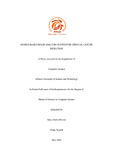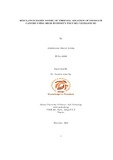Polymer-Based Drug Delivery Systems for the Targeted and Controlled Release of Cancer Drugs in Triple-Negative Breast Cancer (TNBC) Treatment
Main Thesis
Cancer is a disease that exists globally. Among women, breast cancer is most prevalent. Breast cancer exhibits different degrees of aggressiveness. Triple-Negative Breast Cancer (TNBC), which accounts for approximately twenty percent of breast cancer cases, is one of the most aggressive types of breast cancer, and it disproportionately affects women of African and Hispanic origins. Because TNBC is characterized by lack of expression of estrogen receptors (ER), progesterone receptors (PR), and human epidermal growth factor 2 receptors (HER2), all of which are essential targets for established hormonal therapies and anti-HER2 agents, it is difficult to treat. Currently, conventional methods such as chemotherapy and radiation are used to treat TNBC. Those treatment methods, however, are not very effective because they lack specificity, and they are undesirable due to their high dose requirement, low therapeutic indices, poor bioavailability, and other adverse side effects. To improve TNBC treatment outcomes, therefore, it is essential to explore and develop targeted cancer drug delivery systems that pass muster where current, conventional TNBC treatment methods fail. This thesis, part of which has been published, encapsulates the use of materials science and engineering approaches to develop targeted drug delivery systems for controlled and localized treatment of TNBC. The thesis contains six chapters. Chapter one covers the introduction, and chapter two covers the literature review. Chapter three discusses the results of an in vitro and in vivo study of a unique blend of polymers [poly (lactic co-glycolic acid) - polyethylene glycol] microspheres that encapsulated LHRH-conjugated and unconjugated drugs, respectively. Chapter four highlights the use of poly (lactic-co-glycolic acid) – chitosan – polyethylene glycol microspheres encapsulating model anti-cancer drugs [prodigiosin and paclitaxel] for controlled drug delivery in TNBC treatment. Chapter five presents the results of a combined experimental and analytical in vitro and in vivo study of blended FDA-approved polymers [poly (lactic-co-glycolic acid), polyethylene glycol, and polycaprolactone] with the potential for sustained localized cancer drug release. Chapter six contains conclusions and suggestions for future work.


